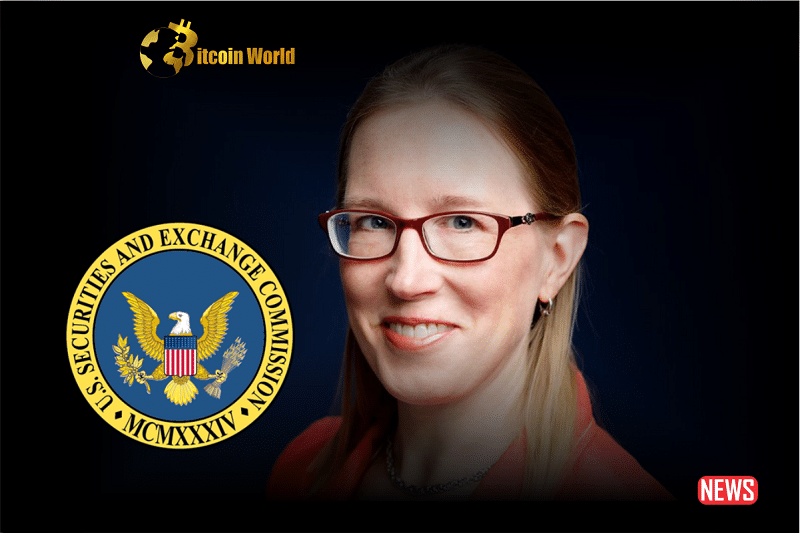The world of crypto is no stranger to regulatory scrutiny, and recent moves by the United States Securities and Exchange Commission (SEC) are once again stirring the pot. At the heart of the discussion is a recent SEC statement advising accounting firms to steer clear of non-audit work for crypto clients. While the intention is to boost transparency, SEC Commissioner Hester Pierce is raising some critical questions. Could this well-meaning advice actually hinder the progress of crypto platforms striving for openness?
Hester Pierce’s Perspective: Is the SEC’s Approach Too Restrictive?
Commissioner Pierce, a known advocate for a more measured approach to crypto regulation, took to Twitter on July 28th to voice her concerns. She wonders if the SEC’s current stance might inadvertently discourage genuine efforts within the crypto space to become more transparent. It’s a valid point – are we potentially throwing the baby out with the bathwater?
Here’s the crux of her argument:
- The SEC’s goal is investor protection, a sentiment everyone agrees with.
- However, discouraging accounting firms from engaging with crypto clients, even for non-audit work, might stifle initiatives aimed at increasing transparency.
- Are we inadvertently creating an environment where crypto platforms find it harder to demonstrate their legitimacy and build trust?
The SEC’s Stance: Why the Caution?
On the other side of the debate is Paul Munter, the SEC’s chief accountant. He firmly believes the warning is necessary to safeguard investors. His concerns revolve around the potential for misleading information and a lack of comprehensive oversight when it comes to non-audit engagements.
Munter’s key points include:
- Non-audit work might lack the rigor of a full financial statement audit.
- There’s a risk of “selective disclosure,” where crypto firms might present only favorable aspects of their business to accounting firms.
- This selective information could then be misconstrued by investors as a complete picture, leading to potentially flawed investment decisions.
- The ultimate goal is to provide investors with “reasonable assurance” through thorough and independent audits.
The Auditor’s Dilemma: Navigating Confidentiality and Reputation
So, where does this leave accounting firms? They’re caught in the middle, facing their own set of challenges. Munter’s suggestion of a “noisy withdrawal” – essentially publicly disassociating from a client – adds another layer of complexity.
What are the hurdles for auditors?
- Confidentiality: Auditors are bound by strict confidentiality agreements, making public pronouncements difficult and potentially legally problematic.
- Reputational Risk: As Mike Shaub, a professor at Texas A&M University, highlighted, some firms are eager to gain credibility by associating with the burgeoning crypto industry. However, they might become less responsive when issues arise, creating a reputational risk for both the firm and the industry.
Striking the Balance: A Path Forward for Crypto Transparency?
The core issue boils down to finding the right balance. How can regulators ensure investor protection without hindering the growth and maturation of the crypto industry? How can crypto platforms demonstrate their trustworthiness, and how can accounting firms navigate this evolving landscape?
Here are some potential considerations:
- Clearer Guidelines: Perhaps more specific guidelines from the SEC on what constitutes acceptable non-audit work could provide clarity for accounting firms.
- Industry Standards: The crypto industry itself could take the initiative to develop and enforce higher standards for transparency and reporting.
- Education and Awareness: Continued efforts to educate investors about the complexities and risks associated with crypto investments are crucial.
The Bottom Line: A Delicate Dance
The debate sparked by Commissioner Pierce’s concerns underscores the delicate dance between regulation and innovation in the crypto space. While the SEC’s intentions are rooted in protecting investors, it’s crucial to consider the potential unintended consequences of its actions. Discouraging all non-audit work might inadvertently make it harder for legitimate crypto platforms to build trust and demonstrate transparency. As the industry continues to evolve, open dialogue and a nuanced approach will be essential to fostering a healthy and trustworthy crypto ecosystem. The question remains: can regulators and the crypto industry find common ground to achieve both investor protection and responsible innovation?
Disclaimer: The information provided is not trading advice, Bitcoinworld.co.in holds no liability for any investments made based on the information provided on this page. We strongly recommend independent research and/or consultation with a qualified professional before making any investment decisions.



